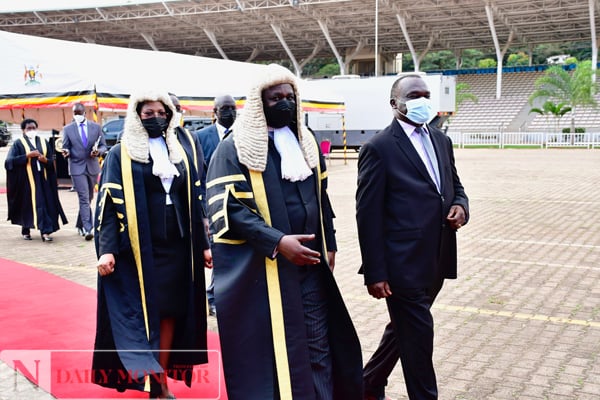Prime
MPs to elect new Speaker before next House sitting

L-R: Deputy Speaker Anita Among, and then Speaker Jacob Oulanyah and Chief Justice Alfonse Owiny-Dollo arrive at Kololo ahead of president Museveni's state of the nation address in 2021. PHOTO/ ABUBAKER LUBOWA
What you need to know:
- By dying before the 10 month in office, Oulanyah, a former Uganda Peoples Congress (UPC) adherent-turned-NRM diehard, becomes the shortest-serving speaker of Uganda’s Parliament.
Lawmakers are to elect a new Speaker of the 11th Parliament following the death of incumbent Jacob Oulanyah, according to the Constitution.
Article 82(4) provides that subject to Clause (4) of Article 81 of this Constitution, “no business shall be transacted in Parliament other than an election to the office of Speaker at any time that office is vacant”.
Clause 4 of Article 81 relates to incoming lawmakers taking oaths of office, and of Member of Parliament, in order to be eligible to vote, and be voted, as Speaker.
ALSO READ: Museveni eulogizes ‘good cadre’ Oulanyah
The Speaker’s office fell vacant after President Museveni yesterday confirmed that Oulanyah, a two-term deputy speaker, had passed on in Seattle, the capital of Washington state in the United States.
The Office of the Speaker is the executive head of the Legislature and the Speaker is the third top ranked in the national order of precedence.
Oulanyah, who represented Omoro County in the House, was a member of the ruling National Resistance Movement (NRM) party chaired by President Museveni.
With a commanding lead in the House, NRM is expected to retain the chair, which is crucial for influencing legislative outcomes and resource appropriation to achieve ruling party’s promises in the manifesto.
By dying before the 10 month in office, Oulanyah, a former Uganda Peoples Congress (UPC) adherent-turned-NRM diehard, becomes the shortest-serving speaker of Uganda’s Parliament. The death also throws ajar the succession gate, with ruling party insiders saying jostling for the juicy position has been underway.
The supreme and subsidiary laws do not have an express provision about the office of Speaker being vacated by reason of death and constitutional lawyers, Mr Peter Walubiri, said the framers of the Constitution did not likely envisage a situation of a serving Speaker passing on.
“It must have been an oversight [because] there is a provision [about] what happens next in case a President dies while in office,” he said.
Article 109 of the Constitution provides that in the event an incumbent president dies, resigns or is removed, the Vice President shall assume office of the President until fresh elections are held.
Mr Walubiri argued that parliamentary business should wait until Oulanyah is accorded a decent send-off.
“The House is not fully-constituted without a Speaker,” he said.
ALSO READ: Jacob Oulanyah’s most memorable quotes
Ms Cecilia Ogwal, a long-serving legislator and Dokolo District Woman MP, said there was an oversight in their 1993-95 Constituent Assembly debates and that the issue of a Speaker dying in office was not well-addressed.
Instead, the CA delegates toyed with the idea of having more than one deputy, according to Ms Ogwal.
“This [Oulanyah death and resulting vacancy] has now provided us with the opportunity to do so [address the loophole in the Constitution],” she said, adding that deputy Speaker Anita Among has been overwhelmed.
Ms Among abruptly adjourned Parliament indefinitely last Tuesday and together with others, including Chief Justice Owiny-Dollo, took a flight to check on Mr Oulanyah, who had been hospitalised in Washington, US, since early last month.
The Speaker, and the deputy, if they die in office, are under the Parliamentary Pensions (Amendment) (No.2) Act, 2011 (Part D), entitled to be accorded a state funeral, meaning all expenses shall be shouldered by the State.
State and a 17-gun salute at burial.
Under the law, 30 percent of the gross annual salary of the deceased office bearer shall be used towards the funeral expenses and the government shall declare a mourning period while national flags will fly at half-mast.
Also, the Act stipulates that the day of burial shall be declared a public holiday, in accordance with the Public Holidays Act.




